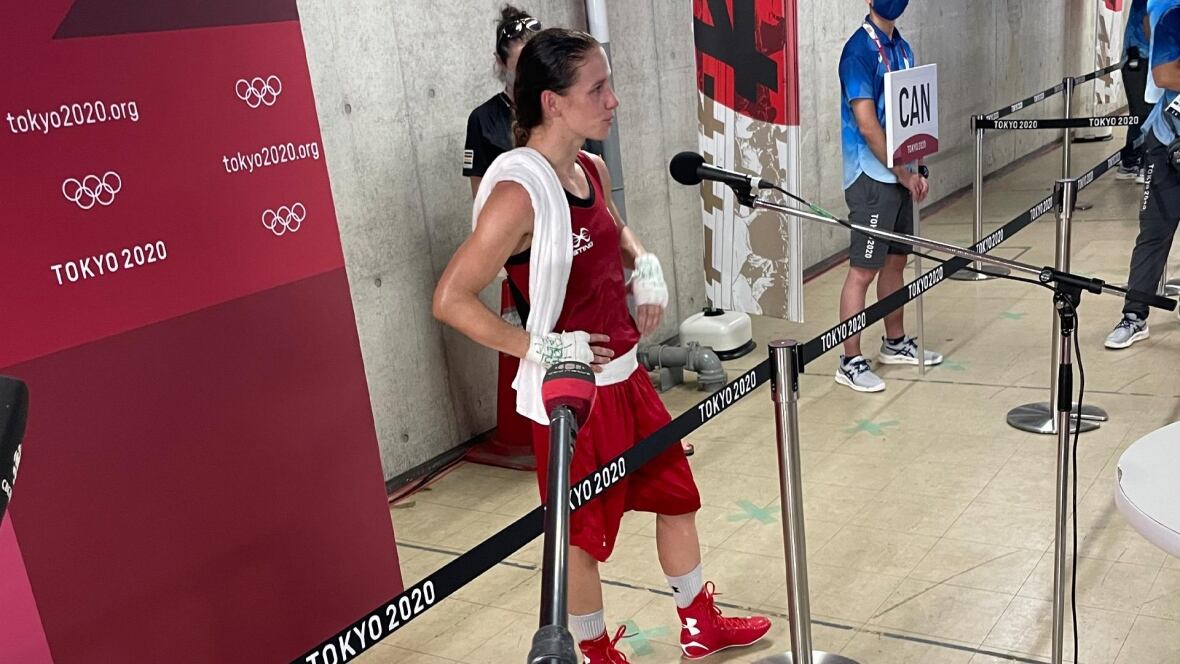Boxer Mandy Bujold's Olympic fight comes to quick end after legal battle to reach Tokyo
'I wanted to give it a last shot at these Olympics,' Canadian says after loss

After all of the hard work Canadian boxer Mandy Bujold did outside the ring to make it to the Olympics, she was unable to deliver the knockout punch inside it.
Bujold, 34, lost a unanimous decision to 29-year-old Serbian Nina Radovanovic in the preliminaries of the women's 48-51 kg division on Sunday in Tokyo. For Bujold, who said before Tokyo that these would be her final Games, it marks the end of an illustrious career.
"It's been a tough battle, I wanted to give it a last shot at these Olympics," Bujod said through tears after the fight. "I didn't have my coach in the corner. There were a lot of elements outside of what everyone saw. I did what I could in the given circumstances."
Bujold, from Kitchener, Ont., came out tentative and couldn't seem to find her footing or rhythm, never really threatening the Serbian fighter.
It was hard to predict how she would do in Tokyo. Despite being an 11-time national champion and now the only Canadian woman to fight in two Olympics — she finished fifth in Rio in 2016 — this was her first competitive fight in more than 18 months. She didn't look sharp.
"I just felt like I was counter-reacting to what she was doing. I knew what she was trying to do," Bujold said of her opponent.
"Whether that's the fact I haven't been in the ring for 18 months or the fact that it was a roller-coaster to get here, it's just hard to say."
Bujold's battle to actually get to these Olympics made international headlines, earning support from a number of high-profile athletes, including retired tennis legend Billie Jean King.
During 2018 and parts of 2019, Bujold, who was ranked No. 2 in the world at the time, was out of the ring on maternity leave after giving birth. But after the COVID-19 pandemic cancelled a number of key Olympic qualifying tournaments, she appeared to be out of luck.
WATCH | Bujold's Olympics come to quick end:
Successful appeal to reach Tokyo
It was only after a successful appeal to the Court of Arbitration for Sport (CAS) that she made it to Tokyo. The court ruled that the qualifying criteria should have taken into account women who were pregnant or had recently had a baby.
"A lot of people kept saying this one person can't take on the IOC, it's impossible, it's not the right time but I did it, I made it happen," Bujold said. "I think I'm going to make it easier for a lot of other women.
"There's a lot of women in these Olympics that are mothers and Olympians. It's good to show your kids what you can continue to do even though you have a family."
She plans on sharing more one day about her historic battle.

"I will one day be writing a book because there's a lot stuff you guys don't know that's happened," she said.
Boxing is one of those sports that thrives on having a live audience — the swell of applause rising and falling with each punch landed. But the 7,300 seats in Kokugikan Arena, the spiritual home of the Japanese national sport of sumo wrestling, sat empty.
Bujold acknowledged she could have used the boost.
"I was trying to change gears but it was different, there was no atmosphere. I was trying to get that internal push but it just didn't come," Bujold said.

The eerily quiet arena did create an interesting dynamic. You could hear almost every word being said from the coaches and trainers in either corner. Even better, you could hear the thump of each blow delivered.
Bujold said her focus will move to her life outside the ring back in Kitchener. She already has a two-year-old daughter at home who she made a heart gesture to while in the ring. Bujold said she wants to grow her family and turn her attention to new challenges.
"I'm proud that I can call myself a two-time Olympian," she said. "The battle to get here is often harder than the battle fought in the ring.
"I'm proud of my career."

